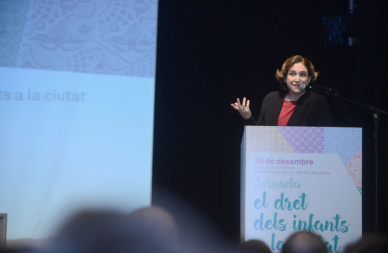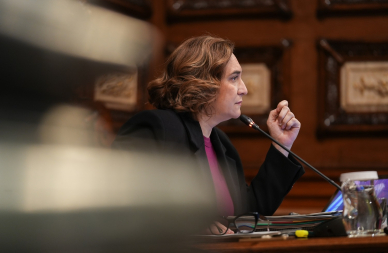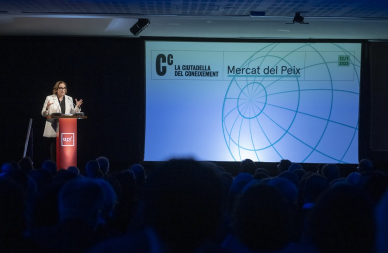24/02/2023
Get to know the Mayor better
Closing ceremony of the “Infants’ rights in the city” conference
Share it
Speech of the day 15/12/2016
 Click to enlarge and watch the video
Click to enlarge and watch the video
Share it
“Either we’ll have a fortified city or we’ll have a city whose residents have learnt to look after themselves and others and take responsibility for one another.”
Good afternoon, everyone.
Many thanks to all of you who have participated throughout the day and I am especially grateful to Francesco Tonucci and Carles Capdevila for agreeing to be here today and for their talks, because this has not only been insightful and has convinced us more than we already were, but they also made us laugh, which was greatly appreciated.
I am doubly grateful, because one of the tragedies is how institutional politics is conceived today. You know that today the institution (hopefully we can all change this) is organised in a very hierarchical way, with very fixed and rigid roles. A mayor is asked to be everywhere and to go to the thousands of events that take place in such a lively city. The agenda fills up on its own. It’s something that needs to have an eye kept on it. This means that you often find yourself attending lots of very interesting events and conferences where you are expected to speak at the opening or closing ceremony. It would be very good for politics and institutions if those of us in the highest offices were to listen much more than we spoke. That’s why I asked to attend this day, to listen and learn.
You made a direct appeal and you have given us encouragement. You have convinced me as a mother, because one of the experiences we have as parents is that once you have a child, the city changes radically: full of obstacles and diversity (a euphemism) that you never knew about. As Mayor, I arrived convinced and I leave greatly encouraged, because in the municipal government we believe that taking back the city for children is also, and most importantly, taking back the city for everyone. As Francesco said, not only do we need to listen to children, we need them to improve ourselves and our city.
When we talk about adapting the city for children, so far we have focused on filling gaps- making more and better playgrounds, having more educational, sports and cultural facilities for children and young people, school paths, which should become school neighbourhoods. Actually, I think all these issues are very important, but we all believe that we need to go further and incorporate the point of view of children into city policies, not only to ensure the policies respond to our children, but so that they are better in general and for everyone.
We could give many examples. The issue of mobility has come up, I think it is significant and symptomatic. We could look at another example, one for which I am directly responsible, which is security. This is normally associated with the Guàrdia Urbana police force; everyone thinks of control, surveillance, CCTV, restricted movement, potential dangers. This way of thinking about security leads us to build a story where we are obliged to choose either one thing or the other: security or freedom, as if these two things were incompatible. If, however, we adopt the perspective, the view of a child, things change radically: security is freedom. In fact, it’s impossible to have security if freedom is missing. Because for a child, a secure city is one where they can play in the street, where their fathers and mothers don't suffer simply because their children are playing in the streets and doing what they want in public spaces and feeling that it is theirs and that they are the protagonist. Francesco put it very well, we know that a street is dangerous because there are no children. We could change our concept of security for the city and work under this motto. Paradigm shifts do not take place over a couple of days and we need to all take responsibility for this bold act, we need to have imagination and defend these policies with the eyes of a child.
So, it depends on the viewpoint we take when we develop a policy: whether we’ll have a fortified city or a city where its residents have learnt to take care of themselves and those around them. A city in which through collective learning, we learn to look after ourselves and others.
As I said, this could be applied to many other issues. The issue of mobility has come up. We, the government, are ambitious, we are clear that this is a key issue for the city. We have accident rates that are unacceptable and we should not resign ourselves to this situation. We also have unacceptable levels of pollution that threaten our health, that of our children and the elderly, but in general put at risk all of us having a healthy life, and this means reducing numbers of private motor vehicles, which are over-represented in the city. It is therefore a matter of social justice, we must all call for rational car use. When these changes, superblocks, trams, cycle lanes, are proposed, we are called bonistes, utopians, romantics, anti-democrats. However, we are very clear that this is the way to make Barcelona more humane, friendlier.
In 2017 it will be 10 years since Barcelona was recognised by UNICEF as a Child Friendly City for having a children's plan and a children's participation programme, with a public hearing for boys and girls, which today is carried out at district and sectoral level in the city.
But we need to go much further, we need to update this commitment of the city to children and young people with much more ambition. I really liked the idea of having children's councils, because we need them and not out of generosity or to have a good idea of ourselves.
There is a quote from Nelson Mandela that says "there is no more intense revelation of the soul of a society than the way it treats its children". This is true. In the speeches we have made, children have also been mentioned as one of the most vulnerable groups in the city. This is true in part, partly because children are not taken into account when it comes to making decisions, but at the same time we must think that we need them, and now more than ever, because they are also the boldest, healthiest and most imaginative group we have in the city. Barcelona has always been a bold, imaginative, pioneering city; but we are at a time of opening that generates uncertainties, the crisis of democracy, the change of the representative system, how to put an end to corruption, how to improve the system, in these fundamental approaches of how to restore confidence in the institutions, we need to be braver than ever. That is why we need our children more than ever, to not be afraid and to think of a city that is humane, rich, diverse and of which we can be proud.

